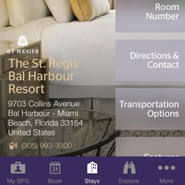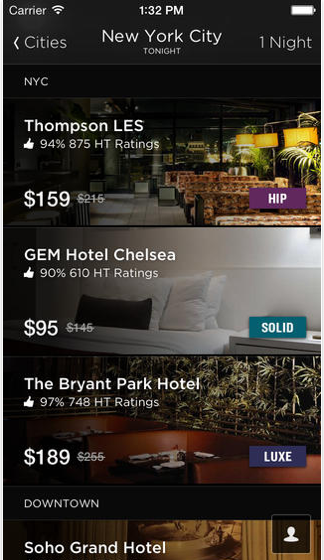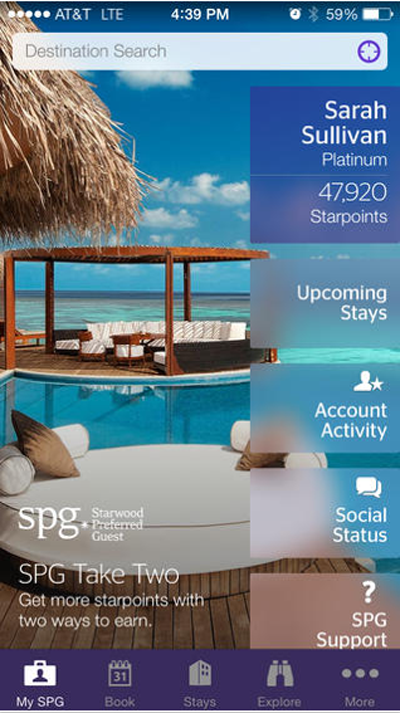
Eighty-eight percent of hotel brands feature a mobile-optimized site and 75 percent of hotels have invested in brand-specific apps or capitalize on parent company iPhone and Android apps, according to a new study by L2 Think Tank.
The "Digital IQ Index: Hotels" also found that 75 percent of hotel brands provide finger-friendly inputs, geolocation, swipe functionalities and collapsible menus on their mobile sites. However, with the steady surge of digital traffic, hotel brands have to devise strategies beyond basic optimization to ward off rapidly adapting online travel agencies.
"It was surprising to see just how digitally-adept most hotel brands in the economy, midscale, upper midscale and upscale categories are," said Mabel McLean, the report's leading researcher at L2 Think Tank, New York.
"This new normal is largely driven by parent companies such as the InterContinental Hotels Group or Hilton Worldwide that can leverage digital investments like mobile apps or site platforms across their portfolios," she said.
The Digital IQ Index: Hotels study attempts to quantify the digital performance of 48 U.S. hotel brands in midscale, upper midscale and upscale classes. Hotel rankings are weighted according to the following rubric: 30 percent site, 30 percent digital marketing, 25 percent mobile and 15 percent social media.
Taking control
The study found that mobile ad spending rises six-fold each year. Online travel agencies have swarmed to capitalize on the bulk of this commerce.
Applications such as Hotel Tonight's have triumphed over branded efforts to earn mobile bookings, according to the study.
 Hotel Tonight app
The top reason why respondents avoid mobile bookings is the difficulty of viewing and navigating. Other reasons include long wait-times, a cumbersome experience, a sense of shoddy security and the need to confirm booking with other people.
Forty-six million consumers will book travel on a tablet in 2013, seven percent more than on mobile phones.
User reviews hold substantial sway over leisure travel booking decisions. Sixty-seven percent of consumers ages 21-34 are significantly influenced by user reviews.
Eighteen percent of consumers 34 and up are similarly influenced. However, almost all surveyed respondents admitted that reviews have some influence over leisure travel booking decisions.
Hotel Tonight app
The top reason why respondents avoid mobile bookings is the difficulty of viewing and navigating. Other reasons include long wait-times, a cumbersome experience, a sense of shoddy security and the need to confirm booking with other people.
Forty-six million consumers will book travel on a tablet in 2013, seven percent more than on mobile phones.
User reviews hold substantial sway over leisure travel booking decisions. Sixty-seven percent of consumers ages 21-34 are significantly influenced by user reviews.
Eighteen percent of consumers 34 and up are similarly influenced. However, almost all surveyed respondents admitted that reviews have some influence over leisure travel booking decisions.
 SPG app
Thirty-eight percent of the hotel brands studied featured user reviews or ratings on their sites.
Consequently, consumers often turn to online travel agencies to read reviews. Forty-four percent of travelers read reviews on online travel agencies, whereas 32 percent read reviews on brand sites.
Digital consistency
The study claims that brands must create a consistent presence on all platforms to prevent online travel agencies from further dominance.
Overall, online U.S. booking revenue is shifting toward hotel brands to a recent high of 59 percent in 2013.
Hotels spend approximately 73 percent of their digital budget on direct response marketing such as search, retargeting and email, which L2 asserts is a game of diminishing returns.
The massive budgets of online travel agencies such as Priceline.com make it difficult for hotel brands to maintain pace.
"Our report found that there is room for improvement in most hotel brands’ tablet experience, which yields more bookings, page views per hotel site visit, and has a higher conversion rate than smartphones," Ms. McLean said.
"None of the brands in our Digital IQ Index has a tablet-specific site, and less than one-quarter employed any tablet-specific features on their mobile sites," she said. "There is also limited investment in apps developed specifically for tablets.
"The standard booking process is also ripe for disruption for better mobile optimization."
Final take
Joe McCarthy, editorial assistant on Luxury Daily, New York
SPG app
Thirty-eight percent of the hotel brands studied featured user reviews or ratings on their sites.
Consequently, consumers often turn to online travel agencies to read reviews. Forty-four percent of travelers read reviews on online travel agencies, whereas 32 percent read reviews on brand sites.
Digital consistency
The study claims that brands must create a consistent presence on all platforms to prevent online travel agencies from further dominance.
Overall, online U.S. booking revenue is shifting toward hotel brands to a recent high of 59 percent in 2013.
Hotels spend approximately 73 percent of their digital budget on direct response marketing such as search, retargeting and email, which L2 asserts is a game of diminishing returns.
The massive budgets of online travel agencies such as Priceline.com make it difficult for hotel brands to maintain pace.
"Our report found that there is room for improvement in most hotel brands’ tablet experience, which yields more bookings, page views per hotel site visit, and has a higher conversion rate than smartphones," Ms. McLean said.
"None of the brands in our Digital IQ Index has a tablet-specific site, and less than one-quarter employed any tablet-specific features on their mobile sites," she said. "There is also limited investment in apps developed specifically for tablets.
"The standard booking process is also ripe for disruption for better mobile optimization."
Final take
Joe McCarthy, editorial assistant on Luxury Daily, New York
